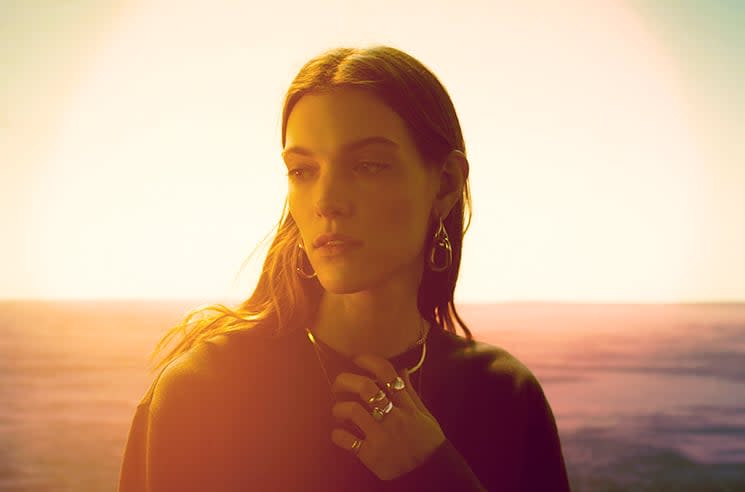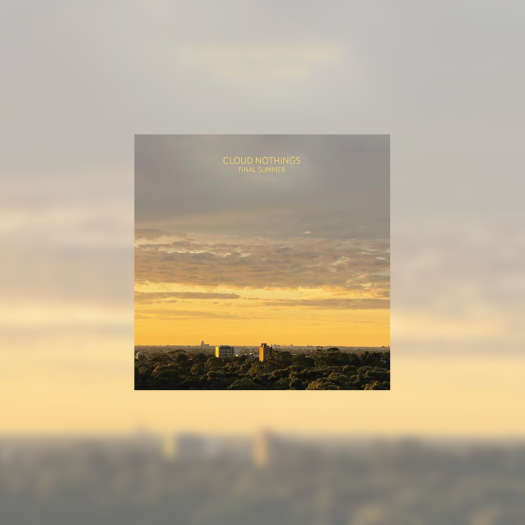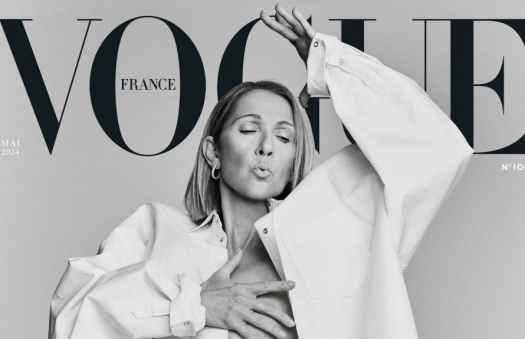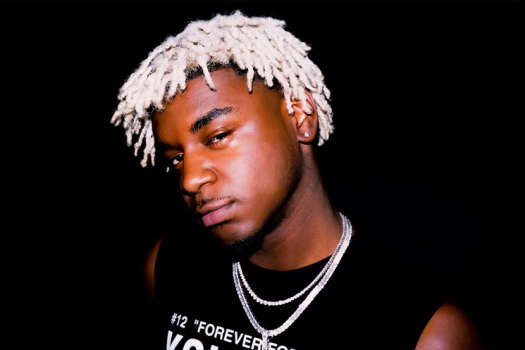"My whole life, I was always very torn between what I wanted people to get from me, what I wanted to show people, and who I really was deep down."
Charlotte Cardin spent most of her young adulthood in the spotlight. The Montreal-based singer-songwriter began a career in modelling as a teenager and, at 18, was a top-four finalist on La Voix, the French-Canadian version of the reality singing competition The Voice. "It was so crazy," Cardin tells Exclaim! about the latter experience, "and fake on a lot of levels because people discovered me singing covers, and I was like, 'I know that I'm a songwriter.'"
In 2015, Cardin released her debut single "Big Boy," the title track of her first EP, which arrived in 2016. The next year, Cardin followed up the release of Big Boy with another EP, Main Girl, and, in 2018, she received two Juno nominations (Breakthrough Artist of the Year and Songwriter of the Year). Across both EPs, which include R&B and electro-pop songs alongside quiet ballads sung in both French and English, Cardin is present but blurred around the edges, like you're looking at her through an Instagram filter. "I was flirting with concepts that weren't as personal or true to things that I had gone through," Cardin says about those early recordings.
With Phoenix, due out in April via Cult Nation, Cardin is finally ready to be herself. The album is filled with lust, love, heartbreak, growth and autonomy — she is unafraid to be seen. On "Sad Girl," she succinctly summarizes the journey she took to make the record, singing, "I got an album from this fucking mess."
"I was always able to show what I thought people wanted to see, and even sometimes not knowing if I was giving something that I really wanted to give or if it was just something that I thought was expected from me," she says, speaking by phone from her apartment in Montreal. "For [Phoenix], I really tried to set all of that aside and just show the real deal."
Music has always played an important role in Cardin's life. Growing up in Montreal, Cardin began taking singing lessons when she was eight, and, when she was going through her self-described "emo phases," she turned to songwriting as a means to sort through her emotions. "It has always been my outlet for my darker side," Cardin says. "It's been really nice to have that because I feel like music is pretty much the only place where I can express certain feelings."
Up until Phoenix, Cardin's steady succession of singles and EPs arrived through a decidedly modern release schedule that catered to streaming habits. She toured extensively behind her small catalogue and saw the size of the venues she performed at get progressively larger. But releasing a full-length album has always been a major goal for Cardin.
"We're kind of in an in-between place where we're like, 'No, people don't really listen to full albums anymore.' But at the same time, for promo and for touring, it's much easier when you have a full album," Cardin explains. "A certain TV show will be like, 'We won't have her on the show until she has an album.' All of these things are evolving at a different pace, and so an album is still important on some levels, but on another level, it was symbolic to me to actually have an album."
Like so many of us, Cardin's life has gotten smaller and quieter during the last year. She has kept busy by practicing guitar and working on new songs, and is eager to get back to playing live music again. But even before COVID-19 lockdowns were in place, Cardin spent most of 2019 off the road and tucked away in the studio making Phoenix.
Until she was faced with making a full-length album, Cardin's songwriting process had been relaxed. Previously, Cardin had allowed inspiration to come to her and would pen a song every few months or so. But the scope of this project forced her to take a different approach. Cardin laughs while admitting, "I thought I was a better songwriter than I was, and I was like, 'Okay, I have to work much harder.'"
After six months of writing by herself, Cardin threw everything away and started from scratch. She decided to co-write songs with her longtime manager, producer and label owner Jason Brando. Cardin describes the collaborative experience as "so fun" — "[Brando] already knows I'm crazy so I have nothing to hide," she says, laughing — and one of artistic growth.
She also notes how much less isolating the creative process felt. "I find that sometimes writing music is a very lonely process of introspection and anxiety, and that wasn't the case at all for this album," she says.
Together, Cardin and Brando plotted the album's 13 tracks, exploring new sonic territories along the way. "We often added a lot of production and then stripped it right down to keep it simple and have the songs all make sense together as one album," Cardin notes.
Phoenix's pop sound ranges from muted gloom — like on the smokey closing track "Je Quitte" and the whirring waves of "Oceans" — to pulsating beats that make you instinctively bob your head in time. "Sex to Me," a song about a friends-with-benefits agreement going sour, begins with a simple picked acoustic guitar melody before the beat drops and, fittingly, complicates everything. The string-accentuated melodrama of "Romeo" recalls Baz Luhrmann's Romeo + Juliet.
But as much as the album's murky instrumentation is hypnotic, it's never meant to be the focal point. "Even though we're touching on a bunch of styles, we wanted the album to have one direction that would tie all of the songs together," Cardin says about Phoenix's sound. "I think that was to put the focus on the lyrics and the vocals."
Cardin's voice is undeniably powerful and, with a restrained instrumental backdrop, her cadence and vocal control shine even brighter. There's a moment on "Anyone Who Loves Me" when Cardin shifts from murmuring about "bitches in Adidas" to belting out the song's triumphant chorus, and it's one of the most excitingly transcendent moments on the record.
The confidence that Cardin exudes on Phoenix follows the boldness of her lyrics. Cardin confronts her emotions loudly, softly, and always fearlessly on the album. When she speaks about her work, Cardin is similarly unreserved, exuding warmth and self-assurance. The title track — which features an appearance from mononymous Montreal-based producer, musician, and viral TikTok creator Lubalin (a.k.a. the "Random Internet Drama" guy) — has a quietly delivered line that feels like something you first have to admit to yourself while hiding under a blanket before saying it to others: "I wasn't very happy when you met me, baby boy."
On the other hand, anger is at a rolling boil throughout Phoenix. "You cheat and you break me apart and you make me lose my mind," Cardin seethes on "Good Girl." In the music video for "Passive Aggressive," the body of a lifeless man juts out of a bass drum and, as Cardin plays the drum kit, the room fills with blood.
"I think there's something very complex about writing music for me, because I need to really feel that urge to express that frustration and anger, but it also helps me understand it when I write about it," Cardin emphatically explains.
"I am in the public eye and people see everything that I do, and judge how I present myself and what stories I tell and how I choose to be. But I think, for every woman, it's the same whether you're in the public eye or not. A song like 'Anyone Who Loves Me' is very much anger-based, but I think it also fuels really intense things that will make the performance, for me, very liberating in a lot of ways."
On the album's cover, there are two Cardins: her true self and a mirrored replica. When Cardin speaks of the internal hurdles she overcame to make Phoenix, named after the resurrectional mythological bird, she points to how she had to push herself as a songwriter and let go of the curated version of herself that she showed to the public. On the opening title track, Cardin acknowledges her rebirth: "I had to burn everything that I want just to come back like a phoenix." The cover image is the final acknowledgement of Cardin's previous form.
"I feel like I have grown so much from this process," says Cardin. "Wherever there's growth and learning new things and opening yourself up to new things that are positive, there's also the sad side to that as well, because you have to stop doing things that you thought were part of yourself. For me, that's what the phoenix represents: the infinite loop of growth and learning to sacrifice parts of yourself."
After spending so many months in lockdown, Cardin is eager for Phoenix to finally be set free. "The album has been mixed and mastered for almost a year now," she says. "Before the songs start to get less personal, I just want to put the album out there." During our conversation, time feels like both a source of stress and a precious commodity to Cardin. There are hints of this dichotomy in the album too, like in "Meaningless," where the days seem to slip through Cardin's fingers like hourglass sand: "I've been wasting my twenties filling glasses half-empty," she sings.
Throughout her career, Cardin has given herself space to grow. After La Voix wrapped up, she didn't jump on the opportunity to capitalize on her sudden fame. Instead she took a step back from the spotlight, went back to school, and spent time working on her craft. "At that point, I needed time to let everything settle," Cardin says. "I knew that the fanbase I had, at least a part of it, didn't like me for the right reasons necessarily, because I hadn't really shown who I was exactly yet. So I needed to find that, and I'm really glad that I did."
Cardin, patiently, found the courage to present her most authentic self.
"It doesn't appear to me like a choice when I make that decision. It's kind of inevitable that I have to take that time if I want to release something that I'll actually believe in and be able to sing onstage and love for a while," she says.
"I started writing the album trying to have a little bit of control over what things I would say and what I would represent. And then I was just like, 'Fuck it.'"
Charlotte Cardin spent most of her young adulthood in the spotlight. The Montreal-based singer-songwriter began a career in modelling as a teenager and, at 18, was a top-four finalist on La Voix, the French-Canadian version of the reality singing competition The Voice. "It was so crazy," Cardin tells Exclaim! about the latter experience, "and fake on a lot of levels because people discovered me singing covers, and I was like, 'I know that I'm a songwriter.'"
In 2015, Cardin released her debut single "Big Boy," the title track of her first EP, which arrived in 2016. The next year, Cardin followed up the release of Big Boy with another EP, Main Girl, and, in 2018, she received two Juno nominations (Breakthrough Artist of the Year and Songwriter of the Year). Across both EPs, which include R&B and electro-pop songs alongside quiet ballads sung in both French and English, Cardin is present but blurred around the edges, like you're looking at her through an Instagram filter. "I was flirting with concepts that weren't as personal or true to things that I had gone through," Cardin says about those early recordings.
With Phoenix, due out in April via Cult Nation, Cardin is finally ready to be herself. The album is filled with lust, love, heartbreak, growth and autonomy — she is unafraid to be seen. On "Sad Girl," she succinctly summarizes the journey she took to make the record, singing, "I got an album from this fucking mess."
"I was always able to show what I thought people wanted to see, and even sometimes not knowing if I was giving something that I really wanted to give or if it was just something that I thought was expected from me," she says, speaking by phone from her apartment in Montreal. "For [Phoenix], I really tried to set all of that aside and just show the real deal."
Music has always played an important role in Cardin's life. Growing up in Montreal, Cardin began taking singing lessons when she was eight, and, when she was going through her self-described "emo phases," she turned to songwriting as a means to sort through her emotions. "It has always been my outlet for my darker side," Cardin says. "It's been really nice to have that because I feel like music is pretty much the only place where I can express certain feelings."
Up until Phoenix, Cardin's steady succession of singles and EPs arrived through a decidedly modern release schedule that catered to streaming habits. She toured extensively behind her small catalogue and saw the size of the venues she performed at get progressively larger. But releasing a full-length album has always been a major goal for Cardin.
"We're kind of in an in-between place where we're like, 'No, people don't really listen to full albums anymore.' But at the same time, for promo and for touring, it's much easier when you have a full album," Cardin explains. "A certain TV show will be like, 'We won't have her on the show until she has an album.' All of these things are evolving at a different pace, and so an album is still important on some levels, but on another level, it was symbolic to me to actually have an album."
Like so many of us, Cardin's life has gotten smaller and quieter during the last year. She has kept busy by practicing guitar and working on new songs, and is eager to get back to playing live music again. But even before COVID-19 lockdowns were in place, Cardin spent most of 2019 off the road and tucked away in the studio making Phoenix.
Until she was faced with making a full-length album, Cardin's songwriting process had been relaxed. Previously, Cardin had allowed inspiration to come to her and would pen a song every few months or so. But the scope of this project forced her to take a different approach. Cardin laughs while admitting, "I thought I was a better songwriter than I was, and I was like, 'Okay, I have to work much harder.'"
After six months of writing by herself, Cardin threw everything away and started from scratch. She decided to co-write songs with her longtime manager, producer and label owner Jason Brando. Cardin describes the collaborative experience as "so fun" — "[Brando] already knows I'm crazy so I have nothing to hide," she says, laughing — and one of artistic growth.
She also notes how much less isolating the creative process felt. "I find that sometimes writing music is a very lonely process of introspection and anxiety, and that wasn't the case at all for this album," she says.
Together, Cardin and Brando plotted the album's 13 tracks, exploring new sonic territories along the way. "We often added a lot of production and then stripped it right down to keep it simple and have the songs all make sense together as one album," Cardin notes.
Phoenix's pop sound ranges from muted gloom — like on the smokey closing track "Je Quitte" and the whirring waves of "Oceans" — to pulsating beats that make you instinctively bob your head in time. "Sex to Me," a song about a friends-with-benefits agreement going sour, begins with a simple picked acoustic guitar melody before the beat drops and, fittingly, complicates everything. The string-accentuated melodrama of "Romeo" recalls Baz Luhrmann's Romeo + Juliet.
But as much as the album's murky instrumentation is hypnotic, it's never meant to be the focal point. "Even though we're touching on a bunch of styles, we wanted the album to have one direction that would tie all of the songs together," Cardin says about Phoenix's sound. "I think that was to put the focus on the lyrics and the vocals."
Cardin's voice is undeniably powerful and, with a restrained instrumental backdrop, her cadence and vocal control shine even brighter. There's a moment on "Anyone Who Loves Me" when Cardin shifts from murmuring about "bitches in Adidas" to belting out the song's triumphant chorus, and it's one of the most excitingly transcendent moments on the record.
The confidence that Cardin exudes on Phoenix follows the boldness of her lyrics. Cardin confronts her emotions loudly, softly, and always fearlessly on the album. When she speaks about her work, Cardin is similarly unreserved, exuding warmth and self-assurance. The title track — which features an appearance from mononymous Montreal-based producer, musician, and viral TikTok creator Lubalin (a.k.a. the "Random Internet Drama" guy) — has a quietly delivered line that feels like something you first have to admit to yourself while hiding under a blanket before saying it to others: "I wasn't very happy when you met me, baby boy."
On the other hand, anger is at a rolling boil throughout Phoenix. "You cheat and you break me apart and you make me lose my mind," Cardin seethes on "Good Girl." In the music video for "Passive Aggressive," the body of a lifeless man juts out of a bass drum and, as Cardin plays the drum kit, the room fills with blood.
"I think there's something very complex about writing music for me, because I need to really feel that urge to express that frustration and anger, but it also helps me understand it when I write about it," Cardin emphatically explains.
"I am in the public eye and people see everything that I do, and judge how I present myself and what stories I tell and how I choose to be. But I think, for every woman, it's the same whether you're in the public eye or not. A song like 'Anyone Who Loves Me' is very much anger-based, but I think it also fuels really intense things that will make the performance, for me, very liberating in a lot of ways."
On the album's cover, there are two Cardins: her true self and a mirrored replica. When Cardin speaks of the internal hurdles she overcame to make Phoenix, named after the resurrectional mythological bird, she points to how she had to push herself as a songwriter and let go of the curated version of herself that she showed to the public. On the opening title track, Cardin acknowledges her rebirth: "I had to burn everything that I want just to come back like a phoenix." The cover image is the final acknowledgement of Cardin's previous form.
"I feel like I have grown so much from this process," says Cardin. "Wherever there's growth and learning new things and opening yourself up to new things that are positive, there's also the sad side to that as well, because you have to stop doing things that you thought were part of yourself. For me, that's what the phoenix represents: the infinite loop of growth and learning to sacrifice parts of yourself."
After spending so many months in lockdown, Cardin is eager for Phoenix to finally be set free. "The album has been mixed and mastered for almost a year now," she says. "Before the songs start to get less personal, I just want to put the album out there." During our conversation, time feels like both a source of stress and a precious commodity to Cardin. There are hints of this dichotomy in the album too, like in "Meaningless," where the days seem to slip through Cardin's fingers like hourglass sand: "I've been wasting my twenties filling glasses half-empty," she sings.
Throughout her career, Cardin has given herself space to grow. After La Voix wrapped up, she didn't jump on the opportunity to capitalize on her sudden fame. Instead she took a step back from the spotlight, went back to school, and spent time working on her craft. "At that point, I needed time to let everything settle," Cardin says. "I knew that the fanbase I had, at least a part of it, didn't like me for the right reasons necessarily, because I hadn't really shown who I was exactly yet. So I needed to find that, and I'm really glad that I did."
Cardin, patiently, found the courage to present her most authentic self.
"It doesn't appear to me like a choice when I make that decision. It's kind of inevitable that I have to take that time if I want to release something that I'll actually believe in and be able to sing onstage and love for a while," she says.
"I started writing the album trying to have a little bit of control over what things I would say and what I would represent. And then I was just like, 'Fuck it.'"




